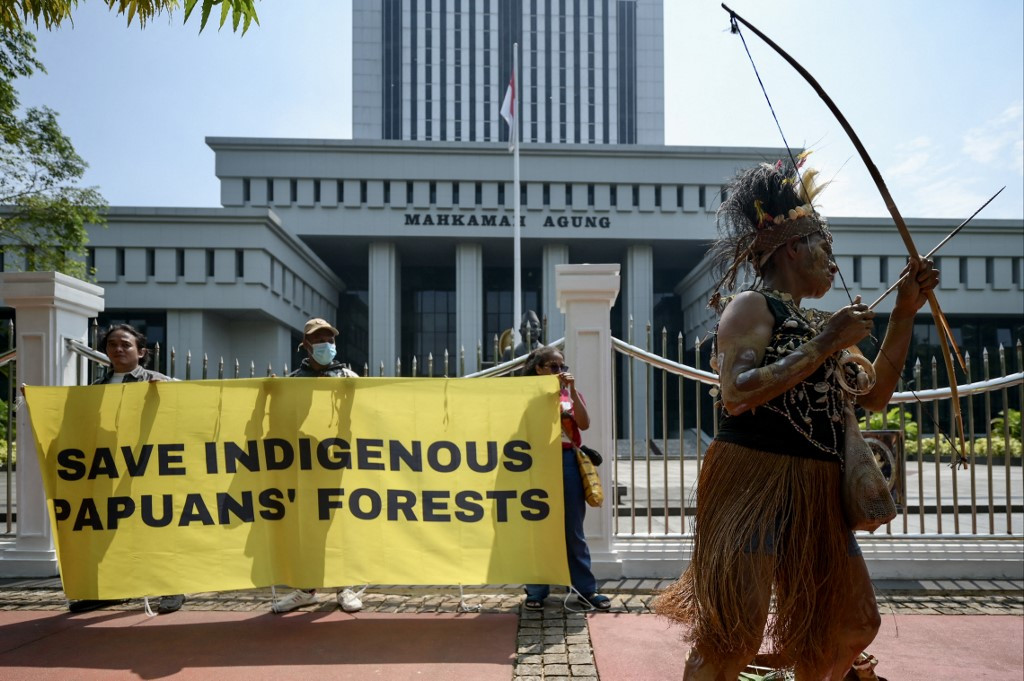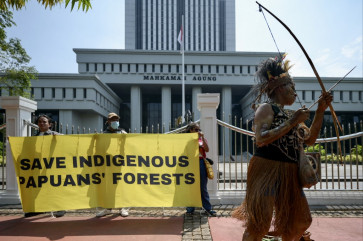Popular Reads
Top Results
Can't find what you're looking for?
View all search resultsPopular Reads
Top Results
Can't find what you're looking for?
View all search resultsLand mafia and the urgency of agrarian reform
Many Indonesians have become victims of land mafia.
Change text size
Gift Premium Articles
to Anyone
 Representatives of the Awyu and Moi indigenous communities protest on May 27, 2024, in front of the Supreme Court building in Jakarta. They called for the country’s highest court to revoke the permits of palm oil companies that are set to operate in Papua, which could potentially clear approximately 300 square kilometers of primary forest. (AFP/Bay Ismoyo)
Representatives of the Awyu and Moi indigenous communities protest on May 27, 2024, in front of the Supreme Court building in Jakarta. They called for the country’s highest court to revoke the permits of palm oil companies that are set to operate in Papua, which could potentially clear approximately 300 square kilometers of primary forest. (AFP/Bay Ismoyo)
L
and mafia practices are very common because of poor agrarian governance. It is very often the victims are those who are vulnerable, as occurred to Mbah Tupon, 68, a resident of Bantul, Yogyakarta. His land certificate was suspected of being misused as collateral by certain parties so that it would be auctioned by the bank. He now faces losing his land, which is his source of livelihood.
Fortunately, many parties support Tupon, from political figures and government officials to the public, especially netizens on social media. The regent of Bantul is committed to defending him. The Bantul Land Office has blocked the certificate in question. The police are currently investigating to find elements of a criminal act in the case.
Tupon's case is just the tip of the iceberg of poor agrarian governance in Indonesia. Many other people have become victims of land mafia, both in the form of misuse and embezzlement of certificates, land grabbing and seizure and eviction from their land because they do not have land documents even though they have lived and managed the land for dozens of years.
Land mafias operate both covertly and openly, involving many actors as well as state and non-state actors, including through formal legal procedures including through processes in law enforcement agencies like court decisions.
Land mafia worsens and escalates agrarian conflicts because it robs people of the basic human right to land and natural resources. Agrarian conflicts have damaged society, economy, culture and development and have worsened the fulfillment of human rights.
Article 33 (3) of the Constitution mandates that the earth, water and natural resources contained therein are controlled by the state for the greatest prosperity of the people. But agrarian conflicts are fundamental problems that have never been fully resolved since Indonesia's independence.
According to the Agrarian Reform Consortium (KPA), agrarian conflicts during president Joko “Jokowi” Widodo’s administration from 2014 to 2024 increased by almost 100 percent compared to the Susilo Bambang Yudhoyono (SBY) administration from 2004 to 2014, with 2,939 cases of agrarian conflict in Jokowi’s era compared to 1,520 during his predecessor’s time in office.


















